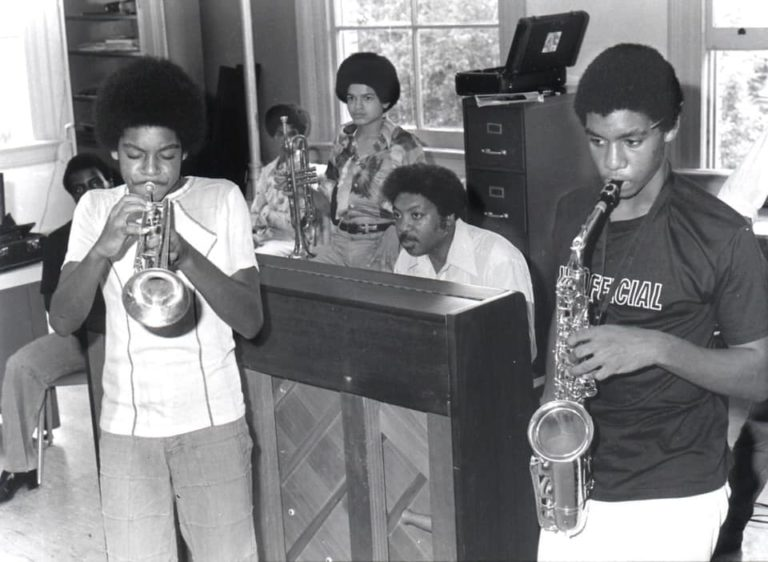Wynton Marsalis Compares Jazz With Democracy
- @ Cynthia Adina Kirkwood

- Aug 22
- 4 min read
Jazz's "ethical framework of reference is about achieving balance. That's what the American Constitution struggles with: how you you maintain balance in an ever-evolving environment when it's so easy to be unbalanced."
I treasure the video cassette, Baroque Duet (1992), which I taped from BBC Television shortly after leaving the United States 31 years ago. The VHS tape is a documentary of two world-renown musicians -- trumpeter Wynton Marsalis and operatic soprano Kathleen Battle -- reaching for perfection in making the eponymous album.
Baroque Duet features the two American musicians while the chamber Orchestra of St. Luke's, based in New York, rounds out the musical conversation. Playing Baroque Duet helps to assuage my homesickness.
The documentary takes place over a period of months.
In it, Kathleen Battle celebrates Easter in Portsmouth, Ohio, at her extended family's African Methodist Episcopal Church, where the down-to-earth singer performs a solo with her first piano accompanist, who never left home. Wynton Marsalis goes home for Halloween to New Orleans, where he plays a fundraising gig with his father and two brothers. Interspersed in the film are rehearsals of George Frideric Handel's (Let the Bright Seraphim from Samson) and Johann Sebastian Bach's (Jauchzet Gott in Allen Landen aria) with two elders, the individual longtime teachers of the soprano and the trumpeter.
Baroque Duet documents the collaboration between two musicians who achieve a balance of give and take, centered around classical music scores, in the making of the album. On the other hand, Wynton Marsalis says that jazz demands this balance in improvisation.
The Managing and Artistic Director of Jazz at New York's Lincoln Center, Director of Jazz Studies at The Julliard School and President of the Louis Armstrong Educational Foundation draws a parallel between jazz and democracy in an interview on Influential With Katty Kay, BBC News, earlier this year.
The following is an excerpt:
"Why do you think jazz had to be made here in America?"
"The ethical framework of reference is about achieving balance. That's what the American Constitution struggles with: how you can maintain balance in an ever-evolving environment when it's so easy to be unbalanced.
"So, that is ultimately what makes jazz so difficult to maintain and to teach because, at the end of the day, do we want to be in balance with other people or do we want to just tell them what to do?
"And it's a struggle in households. There's a struggle in communities. It's a struggle in cities. It's a struggle in the world.
" 'I have the power to destroy you. I think I'll just do that. I like your land. I can outthink you. I think I'll just lie my way through this. I don't mind you being dirt poor. Matter of fact, let me make being homeless a crime. We'll set up a debtor's prison. Let me. Let me. Let me.'
"That apocalyptic eschatology is always (there); that's the history of the world. The great figures of the world are conquerors. They killed people. They ruined civilizations. They enslaved people. They raped, pillaged, murdered. And now, they're famous across the world: Julius Caesar, Napoleon, Genghis Khan were the greatest conquerors. The greatest said, 'We'll destroy you.'
"Jazz is the opposite of that. We will elevate you. Let me share my space with you. Let me be quiet and let you talk. Let me leave space for your soul.
"We have a rhythm section. That rhythm section is a body that accompanies you as you improvise. Now, we have to balance that space though because, all of a sudden, I'm leaving space for you but damn, you taking all the space. Okay, I want a person to play. Now, all of y'all are playing."
"So, there's no hierarchy?"
"There is always hierarchy, but that hierarchy shifts moment to moment.
"On the bandstand, the soloist has it right away, so you can choose to solo all night. But the drummer determines the direction and the authority. It's a checkdown system. It's very complicated, but it's very very logical. It's like a democracy itself.
"The democracy cannot work if you don't agree on what the rules are. See, I can't make you. A rhythm section can't make a soloist stop. All they can do is stop, which I've seen it do many times. A soloist can wreck a gig and play a 25 -- "
"What happens if you're playing though, and you don't like the way somebody else is playing? You don't like what they're doing on the piano. It's not the way you would do it."
"That's what makes it democratic. You've got to figure out how to fit in with them. Later, you might tell them something but, while you're playing, you can't do anything. Sometimes you don't like what people are doing because you don't understand what they're doing. Sometimes you don't like what they're doing because you want to control everything that goes on. That's not what our music is. We're playing together. It's when you don't trust someone it becomes difficult to play with them because instead of you focusing on what they are playing, now you're listening to what they aren't."

Wynton Marsalis on trumpet (far left), father Ellis Marsalis on piano and brother Branford Marsalis on saxophone (far right)
(Photo from Best Classic Bands credited to the Marsalis Family Archives)



Comments